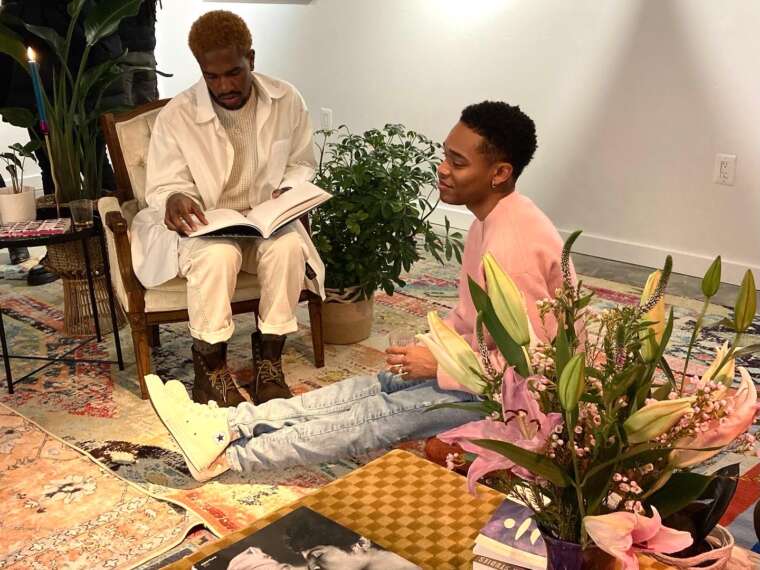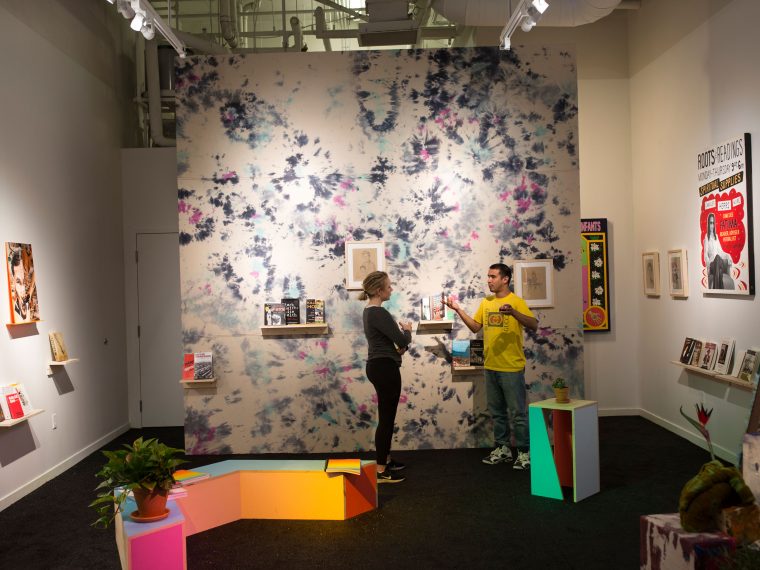12 DC-based artists receive $5,000 grants in support of collaborative research and experimental projects

Washington Project for the Arts (WPA) is pleased to announce the recipients of 2023 Wherewithal Grants. The twelve artists and collectives, each of whom will receive $5,000 to support research or projects, are: Niki Afsar, Ama BE, Safiyah Cheatam & Hope Willis, Alina Collins Maldonado, Andy Johnson, Cecilia Kim, Stephanie Mercedes, Neha Misra & Fid Thompson, Athena Naylor, Anisa Olufemi & Jada-Amina, Mojdeh Rezaeipour, and The Shmutzik Shmates.
Over the next year, these artists will organize public-facing projects and conduct research around topics such as sonic architectures of Black music, practices of care and repair, futurity, land stewardship, invisible transnational labor, eco-art, and archiving the current women-led revolution in Iran.
An independent panel of four artists and curators reviewed 124 applications and recommended the final twelve for funding. The panelists were Fabiola R. Delgado, Experience Developer, Anacostia Community Museum (Washington, DC); Curry Hackett, Artist & Educator (Washington, DC); Thomas F. James, Executive Director, The Last Resort Artist Retreat (Baltimore, MD); and Taylor Roberts, Special Projects & Research Manager, 3Arts (Chicago, IL).
AWARDED RESEARCH
Ama BE, Ngo (Palm Oil)
This trans-disciplinary archival project interrogates unseen, voluntary, land-based African labor that helped feed migrated families and preserve cultural practices on foreign soil. Centered around African migrations to the DC Metro area between 1960–1990, Ngo {Palm Oil} aims to collect nuanced narratives around performances of black labor, sacred land stewardship, and redress absences of African migrants from the landscape of contemporary Africainity and futurist discourses. Fundamentally, this research asks: “How can oral histories of migrant African labor lend themselves to the development of new frameworks for Africanfuturist performance?”
Alina Collins Maldonado, Mother, May I?
Alina’s research focuses on the traditions and expectations passed down from mothers to their daughters and how those same traditions and expectations define who they are. Through conducting interviews and community workshops with women in the DC area, Alina seeks to answer questions about the traditions we choose to pass on and which ones we choose to leave behind.
Andy Johnson, Who Cares for Artists? A Field Guide of Artistic Survival
Andy’s research is propelled by the question of how artists and creatives sustain challenging practices, ones that require mental, emotional, psychological, and physical agility. His research explores the role of care and repair as it pertains to the integrity of the artist themself, rather than the representation of care in objects or exhibitions. Artists carry the weight of complex and difficult subject matter that demands and depletes. They are challenged to remain whole as they alchemize and distill their relationship to gender identity and expression, class, sexuality, race and ethnicity, and immigration status. Thus, Andy asks: “if artists are tasked with caring for the world, who takes care of artists?”
Cecilia Kim, Humanizing Invisible Labor
This project aims to humanize the production of invisible transnational labor. To trace the labor of “productive” industries such as mass-manufacturing plants for consumer goods, Cecilia will connect with individual workers and their communities in the larger social fabric. Using documentary film to expand social impact and accessibility, the film will serve as a record of invisible labor and channel for unrepresented voices. Her research will involve field visits to these sites of labor to explore the narrative potential of sound, and converse with geologists, factory workers, representatives, and museum archivists.
Stephanie Mercedes, Never in Our Image
This research project focuses on how pitches and tones can be pulled from the sound of weapons being destroyed and transformed.
Athena Naylor, Yiayia
Athena is investigating the life of her late yiayia (grandmother). Orphaned at a young age in Bursa, Turkey at the turn of the 20th century, her yiayia did not know her own birthday, nor was she very open about her early years. By researching her life, Athena will interrogate how family histories are passed down generationally and how personal identities form from these fragmented, inherited stories. How can we describe the life of someone no longer able to recount it themselves, and what is lost and gained in the process of doing so? What does telling someone else’s story reveal about how we relate to ourselves?
Anisa Olufemi & Jada-Amina, The Gospel Truth: Sonic Architectures of Chicago House and Go-Go Music
Using The Black Church as a theoretical reference point, The Gospel Truth (TGT) seeks to render Chicago House and Go-Go Music as sonic architectures built in the tradition of transatlantic spirit work. This research aims to uncover the ways in which these sounds engender spiritual restoration, space-making, and futurity for Black communities in DC and Chicago. Operating within a feeling-focused line of inquiry, Anisa Olufemi and Jada-Amina are guided by three interrelated questions: “What modes of Black kinship, revival, and belonging do these genres cultivate? How does the Black Ecstatic (both visceral and visible) arise at The Go-Go and The Warehouse? As these sounds encode the collective memories of under-siege communities, what liberation legacies live on?”
AWARDED PROJECTS
Niki Afsar, Shab-e-Shehr, A Night of Gathering
“Shab-e-shehr” translates from Farsi to “night of poetry,” and references informal gatherings to share and discuss poetry, stories, conversations, and music. The four gatherings, which will take place once a month during the last four months of the year, ending on the holiday Shab-e-Yalda, will invite Iranian and diasporic artists to share their work, and will include an open portion for anyone attending to share poetry, music, and thoughts on how to continue solidarity with the current revolution in Iran. At this critical moment in Iranian history, these gatherings will offer a decentralized space for members of diasporic communities to find one another, share art and knowledge, and imagine shared futures together.
Safiyah Cheatam & Hope Willis, Kufis and Pepperoni Pizza
Kufis and Pepperoni Pizza is a multimedia oral history project that seeks to answer the question, “What influences drove a significant portion of DC’s Black youth to practice Islam and identify as Muslims from 2008–2012?” Through this seemingly simple question, they aim to explore Islam’s relationship to Blackness within an American context. Through their multifaceted and intergenerational cultural preservation work, this research will serve as both a testament and an homage to the evolution of Black folks’ expression of Islam. During the 2023 grant period Kufis will be shared with the public through a powerful audio-visual immersive exhibit and a digital archive.
Neha Misra & Fid Thompson, Nature of Us
This is a collaborative eco-art project germinated by transatlantic artists Neha Misra and Fid Thompson who have made the Washington metro region their adopted home. The project asks: What plant-tree-human love stories insist on persisting amongst the trials and triumphs of our urban lives? How can reconnecting with nature heal us? What role can art play in this? The project gathers and celebrates multi-sensory love stories spanning indigenous, migratory plants, weeds, trees, and people with diverse roots in urban landscapes.
Mojdeh Rezaeipour, ١۴٠١ Archives: an Incomplete Visual History of a Feminist Revolution
With social media as her primary source, Mojdeh has been collecting and organizing a growing archive of imagery from the ongoing Jin, Jîyan, Azadî / Woman Life Freedom revolution in Iran. Over the past few months, she has been working on a series of 80+ panels of mixed media works based on these images, depicting everyday acts of resistance, expressions of solidarity, and rituals of collective care at varying scales. The project will bring this series together with stories and writing by a group of multigenerational Iranian artists, thinkers and historians toward a collaborative publication.
Shmutzik Shmates, The Memories of Letters
This project explores the memories of Jewish letters through the creative imaginings of this collective—a queer, Yiddish burlesque troupe—and a group of artist collaborators throughout the Jewish diaspora. The evolution of Jewish letters and the many languages they came to embody tells a story of diaspora and cultural exchange that destabilizes Zionist narratives of ethno-nationalism and Jewish separatism. Collective members will each personify a Jewish letter and its histories to create a body of writing, performance, and visual art that engages in the act of remembering as a grounding for building other possible futures.

